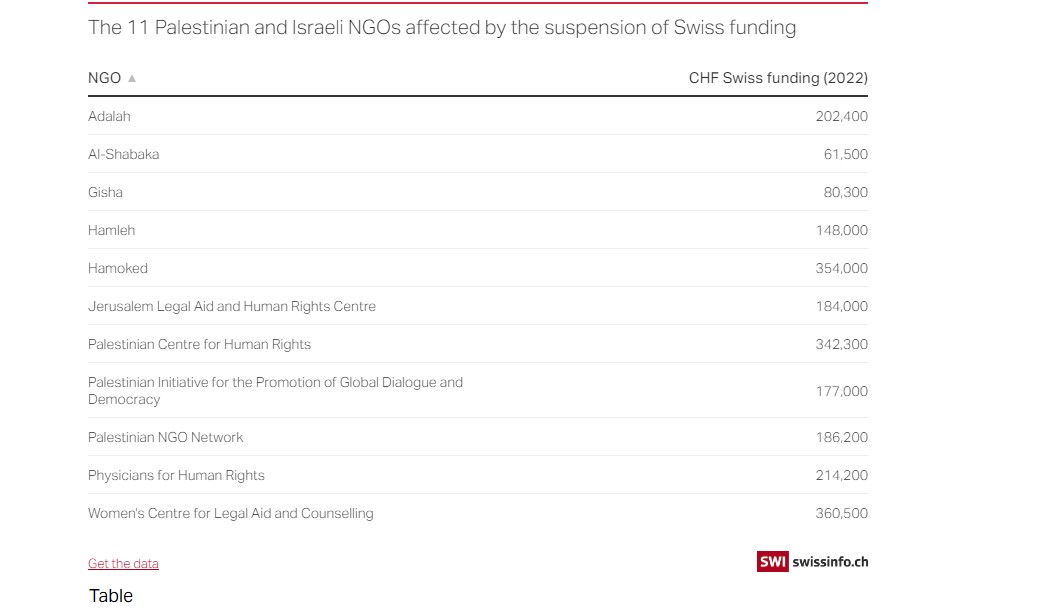Escalating violence in the Middle East has persuaded Switzerland and other countries to suspend funding of some NGOs in the region, pending a review of the existing arrangements with these development agencies.
The decision to freeze funding for six Palestinian and five Israeli NGOs “follows a drastic change in context following the Hamas attack on Israel on October 7 and the resumption of hostilities in the Middle East”, says the Swiss foreign ministry.
“This measure allows us to take the time to adequately assess the relevance of the changed context, as well as the compliance of these organisations’ communications with the [foreign ministry’s] Code of Conduct and anti-discrimination clause to which external partners are subject.”
The suspension affects some CHF2.3 million ($2.5 million) out of a total commitment of CHF4.78 million to fund the activities of NGOs in the region. Switzerland says there is no indication that funds are being used to benefit Hamas, but there are clearly concerns about the political neutrality of some NGOs.
The Tages-Anzeiger newspaper has monitored interviews and social media postsExternal link by NGOs in the bitterly contested region.
The report notes inflammatory remarks about a “brutal military siege”, Israeli actions intended to “ultimately erase Palestinian existence” and of Israeli “massacres” from some Swiss-funded NGOs.
Swiss taskforce
In the face of renewed violence, Switzerland is re-evaluating how to juggle its commitment to funding humanitarian and development support in the region with its strict policy of neutrality.
The government has set up a taskforce to conduct, among other things, “a new detailed analysis of the financial flows linked to the cooperation programme in the Middle East”.
The main emphasis of this evaluation is to make sure Swiss funds are not diverted to Hamas. But the foreign ministry is also keeping a close eye on communications that betray support of political objectives and particularly of violence.
This is not the first time that such concerns have been expressed, having been raised several times in parliament and in the media over the past few years.
In 2018, the foreign ministry revoked funding for a Palestinian women’s rights NGO that had named a youth centre after a terrorist. A year later, the Swiss media reported evidence that United Nations Relief and Works Agency for Palestinian Refugees (UNRWA) funding was connected to projects that praised so-called Islamic martyrs.
After investigating the allegations, Switzerland decided to continue funding the UN agency. This year, Switzerland has pledged CHF23.2 million to UNRWA, of which more than CHF22 million has already been paid.
NGOs protest
This has become an even more sensitive subject since the Hamas attacks on Israel on October 7, which has been followed by ongoing Israeli retaliation. Other countries also took a closer look at their support for NGOs in the region.
Following the Hamas attack on Israel, the European Commission (EC) said it was reviewing development funding to the Palestinian territories, in line with similar decisions by European countries such as Germany, Austria, Sweden and Denmark.
But a backlash by some European Union member states, such as Spain and Luxembourg, forced the EC to tone down its comments.
NGOs that work in the region have expressed concern about the consequences of funding freezes. HEKS Bread for All, a Swiss NGO backed by the Protestant Church, insists that vital humanitarian aid should not be restricted.
“Civil society organisations play a key role in delivering aid, especially at times when civil authorities are unable to provide assistance and services,” said HEKS in an emailed statement to SWI swissinfo.ch. “Preventing them from doing their work may limit the protection of civilians in times of crisis and great need.”
HEKS added that it is “right and important” that the Swiss foreign ministry, hold NGOs accountable for the way they work. “However, purely professional criteria should be applied on the basis of serious evaluations. No ad hoc decisions based on political pressure should be made.”
| Themes |
| • Advocacy • Discrimination • Displaced • Human rights • People under occupation • Regional |














